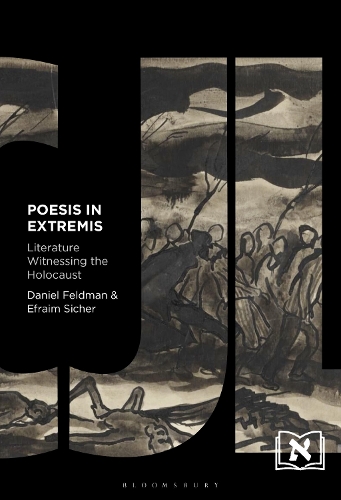
Poesis in Extremis: Literature Witnessing the Holocaust
(Paperback)
Available Formats
Publishing Details
Poesis in Extremis: Literature Witnessing the Holocaust
By (Author) Prof. or Dr. Daniel Feldman
By (author) Prof. or Dr. Efraim Sicher
Bloomsbury Publishing USA
Bloomsbury Publishing USA
21st August 2025
United States
Classifications
Professional and Scholarly
Non Fiction
Literary studies: c 1900 to c 2000
The Holocaust
Literary theory
809.93358405318
Physical Properties
Paperback
272
Width 152mm, Height 229mm
Description
How can genocide be witnessed through imaginative literature How can the Holocaust affect readers who were not there
Reading the work of major figures such as Elie Wiesel, Paul Celan, Avrom Sutzkever, Ida Fink, Wladyslaw Szlengel, Itzhak Katzenelson, and Czeslaw Milosz, Poesis in Extremis poses fundamental questions about how prose and poetry are written under extreme conditions, either in real time or immediately after the Holocaust.
Framed by discussion of literary testimony, with Wiesels literary memoir Night as an entry point, this innovative study explores the blurred boundary of fact and fiction in Holocaust literature. It asks whether there is a poetics of the Holocaust and what might be the criteria for literary witnessing. Wartime writing in particular tests the limits of poesis in extremis when poets faced their own annihilation and wrote in the hope that their words, like a message in a bottle, would somehow reach readers. Through Poesis in Extremis, Daniel Feldman and Efraim Sicher probe the boundaries of Holocaust literature, as well as the limits of representation.
Reviews
A long overdue analysis and cogent discussion of Holocaust literature as literary testimony ... This is essential reading for anyone interested in 20th-century literature and history. * Choice *
Well researched and insightful, this book closes a major gap in Holocaust studies by discussing the role of literature, and particularly that of poetry, as testimony in the spiritual lives of victims during as well as after the Holocaust. * Leona Toker, Professor of English, The Hebrew University of Jerusalem, Israel *
This inspiring study gives a new slant on the vexed question of literary art of the Holocaust era. Through detailed readings of works by such writers as Elie Wiesel and Wladyslaw Szlengel, Ida Fink and Mikls Radnti, Feldman and Sicher compellingly argue that poetic rather than documentary testimony was the most radical outlet for witnesses grief and horror. This important book reaffirms the crucial role of poetry after Auschwitz. * Sue Vice, Professor of English Literature, University of Sheffield, UK *
It is not only by focusing on poetry, but also by insisting on its evidentiary value, that Feldman and Sichers volume becomes a timely and original contribution to a relatively neglected area of Holocaust research, the study of verse. Poesis in Extremis is thoroughly researched, erudite, and engaging, with each chapter providing helpful historical and biographical contextualization, and deftly interweaving these paratextual details with close literary analysis. * Modern Language Review *
Author Bio
Daniel Feldman is Senior Lecturer of English Literature at Bar-Ilan University, Israel, with a focus on Holocaust literature and childrens literature. His scholarship has been recognized with the Childrens Literature Association Honor Article, the Childrens Literature Association Judith Plotz Emerging Scholar Honor Award, and two research grants from the Israel Science Foundation. He is the author of a series of articles on the depiction of the Holocaust in Polish, German, Hebrew, and English poetry and prose. His research has appeared in Comparative Literature, Partial Answers, Childrens Literature in Education, Childrens Literature, Lion and the Unicorn, and Childrens Literature Association Quarterly.
Efraim Sicher is Emeritus Professor of English and Comparative Literature at Ben-Gurion University, Israel, and is author of The Holocaust Novel (2005) and editor of the Dictionary of Literary Biography volume on Holocaust Novelists (2004). His most recent books include The Jews Daughter: A Cultural History of a Conversion Narrative (2017), Re-envisioning Jewish Identities: Reflections on Contemporary Israeli and Diaspora Culture (2021), and Postmodern Love in the Contemporary Jewish Imagination: Negotiating Identities and Spaces (2022).
